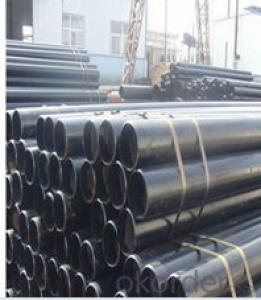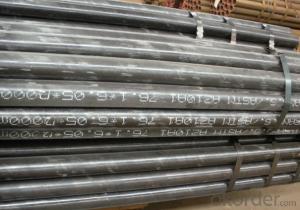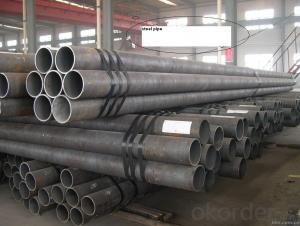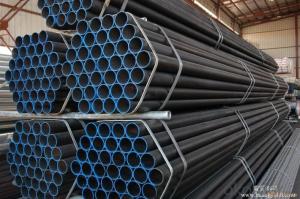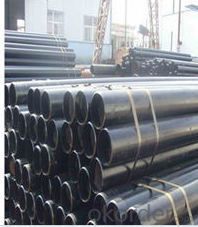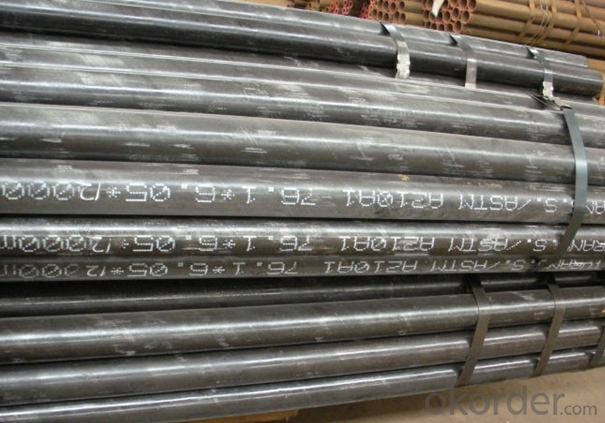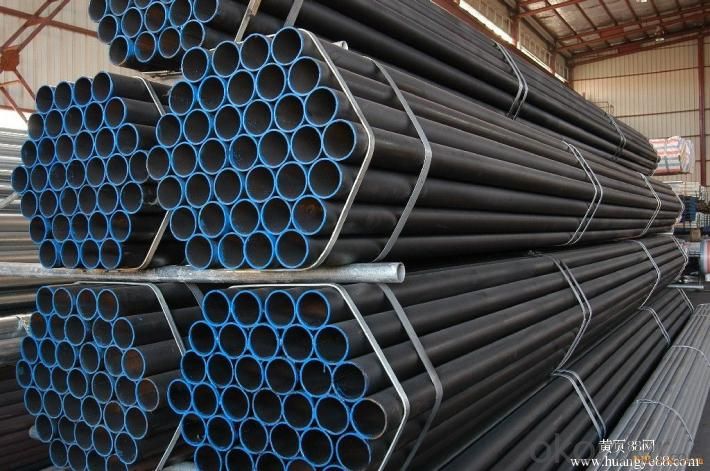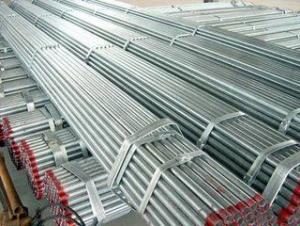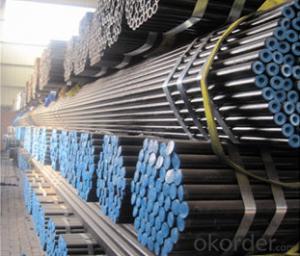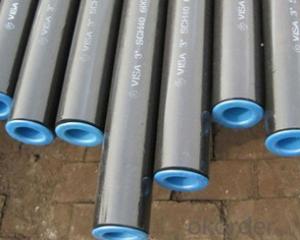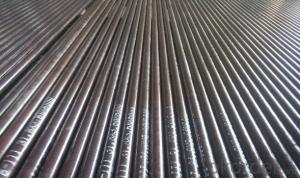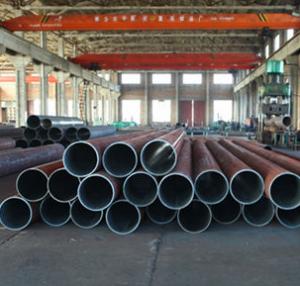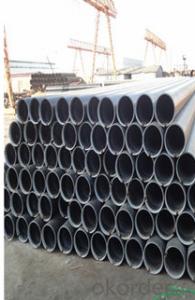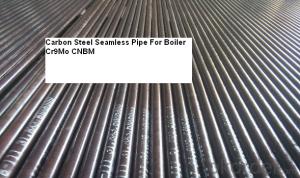High-quality Carbon Seamless Steel Pipe For Boiler 10# CNBM
- Loading Port:
- Qingdao
- Payment Terms:
- TT OR LC
- Min Order Qty:
- 10 pc
- Supply Capability:
- 30 pc/month
OKorder Service Pledge
OKorder Financial Service
You Might Also Like
Quick Details
| Thickness: | 3 - 60 mm | Section Shape: | Round | Outer Diameter: | 21.3 - 1220 mm |
| Secondary Or Not: | Non-secondary | Application: | fluid pipe,boiler pipe, structural pipe, oil/gas/water pipe etc | ||
| Technique: | Hot Rolled | Certification: | ISO9001-2000, ISO14000, ISO18000 , API 5L | Surface Treatment: | Painted, Oiled, galvanized or phosphate etc |
| Special Pipe: | API Pipe | Alloy Or Not: | Is Alloy | Technique:: | Hot rolled or cold rolled |
| Special pipe:: | API/ ASME/thickwall/oil/gas/water pipe | Length:: | 3-12m | Treatment of two ends:: | Beveled end , plain end etc |
| Brand:: | Bai Chuan | Third Party Inspection:: | BV, SGS etc. | Schedule:: | SCH10-SCH160, XS, XXS |
| Other Material:: | 10#, 20#, 16Mn, Q345 etc | Material Type:: | Carbon steel/ Low alloy steel | Producing standard:: | American/Japanese/ German/ Britain/ Chinese standard |
| Grade: | A53(A,B),A106(B,C),A210,API J55,St37,STPG42,A53-A369,API J55-API P110,ST35-ST52 | Standard: | BS EN10296,JIS G3452-2004 |
1. Out Diameter: | 21.3mm-1220mm |
2. Wall Thickness: | 3mm-60mm |
3. Length: | 3m-12m |
4. Producing Standard: |
|
5. Main Material: (Carbon Steel & Low Alloy steel) |
|
6. Special specifications: | Available according to customer’s requirements and quantity. |
7. End Shape: | Beveled end , plain end, varnished, or adding plastic caps to protect the two ends as per customer’s requirements. |
8. Surface treatment: | Painted, Oiled, galvanized, phosphate etc. |
9. Usage: |
|
10. Certificates: | ISO9001-2000, ISO14000, ISO18000, API 5L certificate |
11. Third party inspection: | Welcome you to send a third party inspecting company (BV, SGS etc) to check the quality of our final products. |
12. Pictures: | our producing flow chart, our factory, production line, inspecting equipments, our products are listed below for your reference. |
- Q: Can steel pipes be used for transporting liquids?
- Yes, steel pipes can be used for transporting liquids. Steel pipes have excellent durability, strength, and corrosion resistance, making them a suitable choice for transporting various liquids, including water, oil, gas, and chemicals.
- Q: How much is the tube?
- The first prerequisite we need to determine is: what are the specifications of the steel pipe mentioned? Such as the commonly used steel pipe specifications: diameter 108*4.5, diameter 219*6, diameter 377*10, diameter and wall thickness of steel pipe with different specifications, different weight, so the steel price per meter is different.
- Q: What are the common applications of steel pipes in the oil and gas industry?
- Steel pipes are commonly used in the oil and gas industry for various applications such as drilling, transportation of crude oil and natural gas, and for constructing pipelines and storage tanks. They provide strength, durability, and resistance to corrosion, making them ideal for these critical operations.
- Q: What are the different types of steel pipe connections for oil and gas pipelines?
- There are several different types of steel pipe connections used for oil and gas pipelines, including threaded connections, welded connections, flanged connections, and grooved connections. Each type has its own advantages and is selected based on factors such as the size of the pipeline, the pressure and temperature requirements, and the specific application.
- Q: How are steel pipes protected against external impact or mechanical damage?
- Various methods are employed to protect steel pipes from external impact or mechanical damage. One commonly utilized technique involves applying a protective coating onto the pipe's surface. This coating acts as a barrier, preventing direct contact between the pipe and external objects or forces. Coatings such as epoxy, polyethylene, or polyurethane are frequently chosen due to their excellent resistance to impact and abrasion. Another method of protection involves the use of pipe supports or clamps. These supports are positioned at regular intervals along the pipe's length, ensuring stability and minimizing excessive movement or vibration. They help distribute the load and absorb any external impacts, thus reducing the risk of mechanical damage. Additionally, steel pipes can be reinforced by wrapping them with materials like fiberglass, carbon fiber, or kevlar. These reinforcement materials provide an extra layer of strength and durability, enhancing the pipes' resistance to external impact and mechanical damage. Furthermore, burying the pipes underground or installing them within protective casings can offer an additional layer of protection. This measure shields the pipes from direct contact with external objects, reducing the potential for damage caused by accidental impacts or environmental factors. In conclusion, a combination of protective coatings, supports, reinforcements, and appropriate installation methods ensures that steel pipes are safeguarded against external impact or mechanical damage. This effectively extends their lifespan and maintains their structural integrity.
- Q: What are the common problems or issues faced with steel pipes?
- Common problems or issues faced with steel pipes include corrosion, leakage, cracking, and scaling. Corrosion can occur due to exposure to moisture, chemicals, or environmental factors, leading to reduced structural integrity and potential leaks. Leakage can result from faulty welds, damaged seals, or pipe degradation. Cracking can occur due to excessive stress, temperature fluctuations, or manufacturing defects, compromising the pipe's strength. Scaling or buildup of mineral deposits can also restrict flow and affect performance. Regular inspection, maintenance, and proper coating or lining can help mitigate these issues.
- Q: Seamless steel tube 89X4 meters, how heavy?
- According to the theory, each meter is 8.3844 kilograms. If you want to be precise, you'll lose your own weight.
- Q: What does the diameter of a steel pipe project mean?
- Nominal surface meaning can be understood as a public address. It's as if everyone agreed to call something as a "devil", and he was the devil.Don't be confused by the numbers behind the nominal diameter. For example, DN50, this 50 is really close to the outer diameter or inside diameter of the steel tube, but DN50 is only a general model of the caliber of the national standard.
- Q: What are the factors affecting the pressure rating of steel pipes?
- The factors affecting the pressure rating of steel pipes include the thickness and quality of the steel used, the diameter and length of the pipes, the temperature and fluid being transported, as well as the design and construction of the pipe system.
- Q: How are steel pipes used in the construction of wind farms?
- Steel pipes are commonly used in the construction of wind farms to support and secure the wind turbines. These pipes serve as the foundation for the turbines, providing stability and structural integrity. They are used to create the tower structure, which supports the nacelle and rotor blades. Additionally, steel pipes are used for transporting and distributing the electrical cables within the wind farm, ensuring efficient transmission of electricity generated by the turbines.
Send your message to us
High-quality Carbon Seamless Steel Pipe For Boiler 10# CNBM
- Loading Port:
- Qingdao
- Payment Terms:
- TT OR LC
- Min Order Qty:
- 10 pc
- Supply Capability:
- 30 pc/month
OKorder Service Pledge
OKorder Financial Service
Similar products
Hot products
Hot Searches
Related keywords
